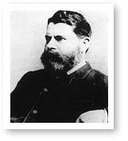Davis, George E.

| Topics: |
George Davis (1850–1906) is generally credited with initiating the concept of chemical engineering. Davis studied at the Slough Mechanics Institute and the Royal School of Mines in London (now part of Imperial College, London) and then headed north to work in the chemical industry around Manchester. Before he embarked on a career as a consulting engineer, he held various positions—one as an inspector for the Alkali Act of 1863, a very early piece of environmental legislation that required soda manufacturers to reduce the amount of hydrochloric acid gas vented into the atmosphere from their factories. Davis was also a moving spirit behind the formation of the Society of Chemical Industry (1881), which he had wanted to name the Society of Chemical Engineering.
In 1887 Davis gave a series of 12 lectures at the Manchester School of Technology, which formed the basis of his Handbook of Chemical Engineering (1901; revised 1904)—the first of its kind. There were already industrial chemistry books written for each chemical industry—for example, alkali manufacture, acid production, brewing, and dyeing—but Davis organized his text by the basic operations common to many industries—transporting solids, liquids, and gases; distillation; crystallization; and evaporation, to name a few.
Further Reading